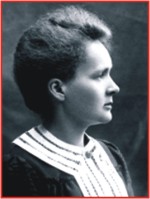Feature
Marie Curie: The First Woman Nobel Laureate, Her Husband & Daughters
Taslima Rawshan
 The Nobel Prize has been awarded for Physics, Chemistry, Literature, Peace, and Physiology or Medicine. The Bank of Sweden more recently has been awarding a non-official, but associated, Nobel memorial prize for Economics. The first five prizes were instituted by the Swedish scientist Alfred Nobel through his Will in 1895; they were first awarded in 1901. The prize for economics, The Sveriges Riksbank Prize in Economic Sciences in Memory of Alfred Nobel, was instituted by Sweden's central bank in 1968. The first prize in economics was awarded in 1969. All six prizes are widely regarded as the supreme commendations in their subject areas. With the exception of the peace prize, which is handed out in Oslo, Norway, they are all handed out in Stockholm at an annual ceremony on December 10, the anniversary of Nobel's death. The Nobel Prize has been awarded for Physics, Chemistry, Literature, Peace, and Physiology or Medicine. The Bank of Sweden more recently has been awarding a non-official, but associated, Nobel memorial prize for Economics. The first five prizes were instituted by the Swedish scientist Alfred Nobel through his Will in 1895; they were first awarded in 1901. The prize for economics, The Sveriges Riksbank Prize in Economic Sciences in Memory of Alfred Nobel, was instituted by Sweden's central bank in 1968. The first prize in economics was awarded in 1969. All six prizes are widely regarded as the supreme commendations in their subject areas. With the exception of the peace prize, which is handed out in Oslo, Norway, they are all handed out in Stockholm at an annual ceremony on December 10, the anniversary of Nobel's death.
First Women Nobel Laureates:
In 1903 only two years after the Nobel Foundation was established, a Nobel Prize was awarded to a woman, Marie Curie, for the first time. Women have been winning Nobel Prizes ever since. She was the first person ever to receive two Nobel prizes: the first in 1903 in physics, shared with Pierre Curie, her husband and Henri Becquerel for the discovery of the phenomenon of radioactivity; and the second in 1911 in chemistry for the discovery of the radioactive elements polonium and radium
Brief Bibliography:
Marie Curie, earlier known as Maria Sklodowska, was born in Warsaw on November 7, 1867; both her parents were teachers who believed deeply in the importance of education. Marie had her first lessons in physics and chemistry from her father. She received a general education in local schools and some scientific training from her father. She became involved in a students' revolutionary organization and found it prudent to leave Warsaw, then in the part of Poland dominated by Russia, for Cracow, which at that time was under Austrian rule. In 1891, she went to Paris to continue her studies at the Sorbonne where she obtained degree in Physics and the Mathematical Sciences. She met Pierre Curie, Professor in the School of Physics in 1894 and in the following year they were married. She succeeded her husband as Head of the Physics Laboratory at the Sorbonne, gained her Doctor of Science degree in 1903, and following the tragic death of Pierre Curie in 1906, she took his place as Professor of General Physics in the Faculty of Sciences, the first time a woman had held this position. She was also appointed as Director of the Curie Laboratory in the Radium Institute of the University of Paris, founded in 1914. Marie Curie died in Savoy, France, on July 4, 1934.
Marie Curie was the first:
1. To use the term radioactivity for this phenomenon.
2. To win a Nobel Prize for Physics, for the discovery of radioactivity (1903).
3. Female lecturer and professor at the Sorbonne University in Paris (1906).
4. To receive two Nobel Prizes.
Mother-Nobel Prize Laureate of daughter-Nobel Prize Laureate. Her oldest daughter Irene Joliot-Curie also won a Nobel Prize for Chemistry (1935).
 Nobel Prize in Physics - 1903 Nobel Prize in Physics - 1903
In 1903, Marie and Husband Pierre Curie were awarded half the Nobel Prize in Physics. The citation was, "in recognition of the extraordinary services they have rendered by their joint researches on the radiation phenomena discovered by Professor Henri Becquerel." Henri Becquerel was awarded the other half for his discovery of spontaneous radioactivity.
Her Two Daughters:
In the midst of her busy scientific career Marie raised two daughters Irene in 1897 & Eve Curie in 1904.The Curies' elder daughter Irene Curie (1897-1956) was also a gifted chemist. She shared a Nobel Prize with her husband, Frederick Joliot. Irène Joliot-Curie won a Nobel Prize for Chemistry in 1935 for discovering that aluminum could be radioactive and emit neutrons when bombarded with alpha rays.
The younger daughter, Ève Curie (born on December 6, 1904) is a French author and writer. She was an accomplished pianist and gave a number of concerts in Europe. Later she would turn her talents to writing, lecturing, and international advocacy on behalf of Free France during World War II. During the 1950s and 1960s, Eve worked for the North Atlantic Treaty Organization (NATO) and for the United Nations 'Children' Fund in Greece. Following her mother's death, Eve Curie turned her talents to writing, and decided to write a biography about her famous mother and wrote an acclaimed biography of her mother, Madame Curie.
(Student of DU) Source: Internet
|
